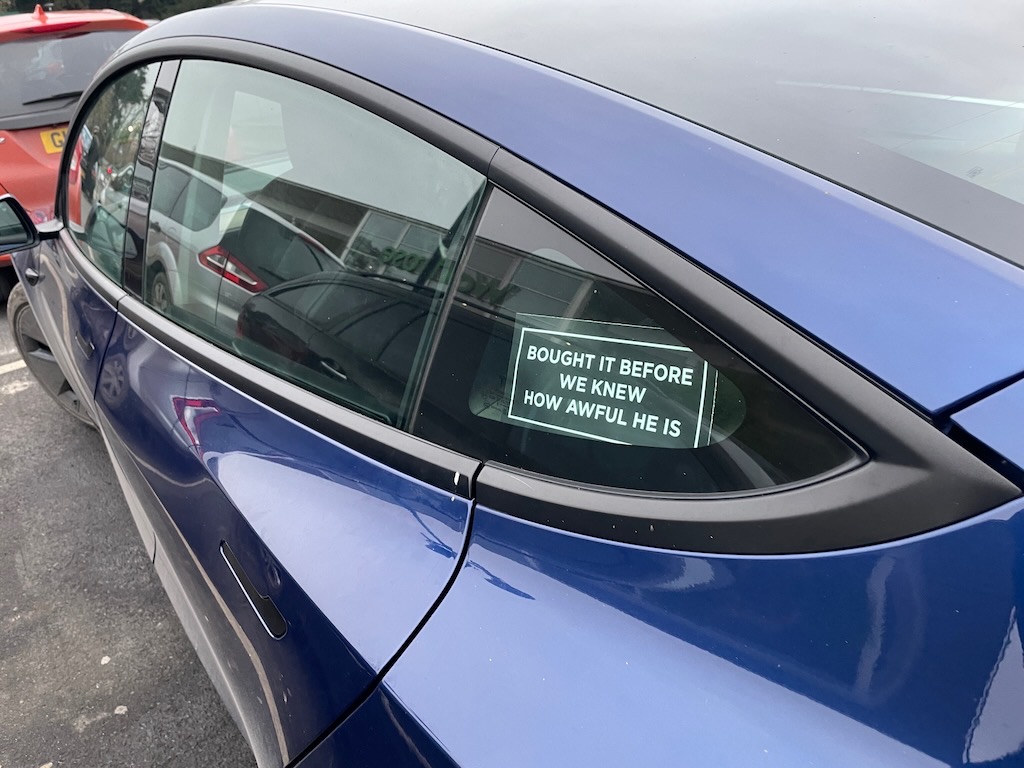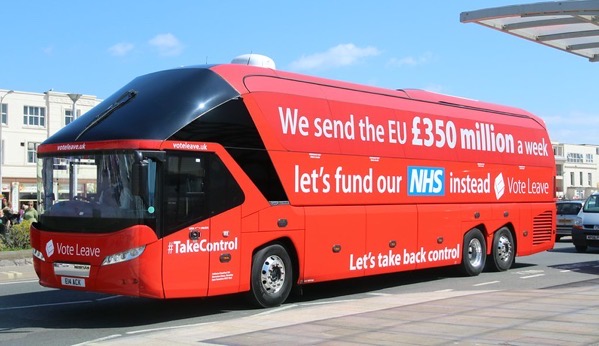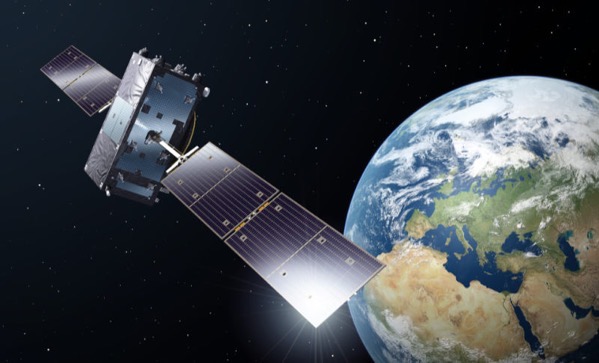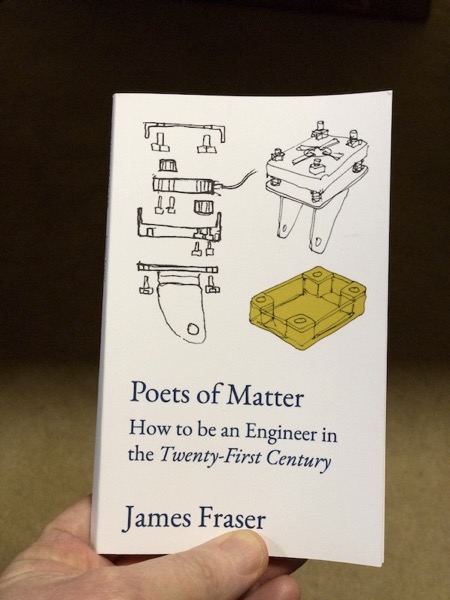I shook Elon Musk warmly by the hand and told him I had enjoyed his talk about rockets. That was more than twenty years ago, when we were both speaking at the same event. (Doesn’t that sound impressive?) He was talking about future space tourism. I was talking about creating IT for the developing world. (Doesn’t that sound virtuous?)
I would, of course, completely refuse to shake his hand now. That’s partly because of, and partly despite, what’s happened since.
Alongside his discussion of space exploration — of which, as a broad generalisation, I am a fan — he also mentioned he was investing in a company that produced electric cars. He was suggesting that they might one day actually be a really viable alternative to petrol-powered ones, although at the time the likelihood of my ever affording such a vehicle seemed roughly the same as my ever going in one of his rockets.
And yet, only a decade or so after that event, we bought our first electric car to replace our diesel Golf, and have never looked back. And a little over four years ago, by shaking our piggy-bank very hard, we bought one of his Tesla Model 3s, which not long afterwards became the best-selling car in Europe. Note that I didn’t say the best selling EV… there have been several months where it was literally the best-selling of all cars. Nowadays Tesla models still regularly hit the top-10 lists even now they have a lot more EV competition, and despite the key Tesla numbers now being split between the Model 3 and the newer and more popular Model Y.
So Elon Musk, in my eyes, built up a huge store of credit, because I believe he has single-handedly done more than any other living person to combat climate change. That’s quite a bank balance.
Though he neither founded Tesla nor designed the cars himself, his perseverance, vision, and willingness to spend his cash where others weren’t, has dragged an entire industry, mostly kicking and screaming, into a far better place, both technologically and for the planet. I remember the shock of traditional car dealers in 2016, trying hard to sell a few more cars at discounts to fill their next quarter’s quota, when it was announced that quarter of a million people had put down a deposit for the recently-announced Model 3: a car they had never even seen. It took that kind of major eathquake to rattle the enormous global inertia of the fossil-burning world and to kick investment in battery-production up to a whole new level. I won’t pretend Musk was doing all of this for purely selfless reasons, or that he did it entirely on his own, but many thousands of Greta Thunbergs combined could not dream of having such an impact. He changed the world.
Now, it also soon became apparent that Musk wasn’t, let’s say, an entirely reliable figure! It’s funny now, looking back, to think my main criticism of him used to be his inability to hit his unrealistic deadlines, and the number of his announced products that never saw the light of day at all. There are drivers now on their third or fourth Tesla who still can’t get the ‘Full Self-Driving’ feature they paid for with their first!
But since then, it won’t have escaped your notice that almost every day’s news has included some new and bigger reason to doubt, dislike, ridicule or fear him, and even the significant amount of slack I was willing to cut him has long since been exhausted.
But here’s the thing. My Tesla is still an annoyingly wonderful car.
It’s not perfect, of course. I bought the Model 3 after having tested several other cars, knowing that it was really too big for European roads, and that it was pretty foolish to buy any car that doesn’t have a hatchback, especially if you regularly transport things like dogs and outboard motors. There wasn’t a dealer close to me. And I knew that, say, the Polestar 2, a similar price at the time, was a more sensible shape and probably much better mechanically. (It’s basically a Volvo, after all.)
But I also knew that Teslas had by far the best software, the best battery-management, and the best charging network, all substantially as a result of the headstart his investment gave them. I wasn’t buying just a car, I realised, I was buying into an ecosystem. So far, I’ve never regretted that choice.
What I didn’t know at the time was that the car would continue to get better during my ownership, as a result of those regular software updates which arrive every month or two. Here are a couple of examples:
1. Lights
When I bought it, I was sad that the Model 3 didn’t have those smart matrix headlights some other expensive cars were getting. Certain Audis, for example, would dim the sections of the headlight beam that were pointing at oncoming cars, to stop them dazzling other drivers. Ah well, I thought. You can’t have everything.
And then, about three years later, a software update turned them on.
Eh? What? I didn’t even know I had the hardware; I thought they were ordinary headlights!
But no, the possibility of individual LED control was built-in, and so after I had already clocked up more than 20,000 miles, the car got a new feature. For free. Which works really well. And it’s smarter than many other systems because it’s based on the computer’s model of surrounding vehicles, rather than just on the detection of headlights, so it will try to avoid blinding cars in front of you in the same lane too, whose drivers might otherwise be dazzled in the rear-view mirror. And I’ve seen it do the same for cyclists.
Many of the visible updates are small and incremental. But this was a really nice big present, and completely unexpected.
2. Brakes
Just before Christmas, I was reversing off a shop’s forecourt into a side-road. I pulled out promptly, turning as I did so, because I needed to get into a gap in the traffic. At the same time, a woman who had been pushing her bike along the pavement suddenly turned it out and crossed the road right behind me. I had no way of knowing she would do that — I was already moving but she was looking the other way — and, though I wasn’t going very fast, it could have been a very bad morning for both of us. I’m pretty sure she would at least have gone to hospital with a broken leg.
But the car saw her, and reacted much quicker than I could, slamming on the brakes so hard that I thought I had hit something solid. I worked out what had happened (and later verified it on the car’s automatic camera recordings). Meanwhile, the cyclist walked merrily across and then cycled off, unaware of her really quite narrow escape. Perhaps she was wearing headphones.
Only a few months ago, a software update introduced an enhancement to the emergency braking which tracks the trajectory of surrounding objects and pedestrians, and works out not just whether they are right in your path, but whether they will be when you get there. I suspect it was probably that which allowed her to walk away oblivious and unharmed. But it wasn’t part of the car when I purchased it, and it didn’t cost me a penny.
–
So yes, I do love this car, and especially the associated ecosystem. It cost us a lot of money, and it’s depreciated a significant amount since then, but it’s been completely reliable so far and the running costs have been very low. For all of these reasons, I expect to keep it a long time.
Which is good, because, since the US election, in which one member of our household voted, I don’t think I’ll be allowed to buy another Tesla in future unless something pretty drastic changes!
Hopefully we can keep this one long enough for some of the competition to catch up a bit more. There’s now a really good choice of other vehicles, and their battery management is getting a great deal better. Personally, I think the local Kia dealer would be my first point of call if I had to change. But a lot of them are more expensive than Teslas now, and have neither the same charging capabilites nor such good and regular software updates.
Still, Elon set the bar high, and Tesla keeps providing the competitive stick driving much of the rest of the industry forward in the hope of those “Could this be a Tesla-beater?” reviews. So I have high hopes for the future.
In the meantime, we feel a bit better from having one of these stickers in the window!






Recent Comments